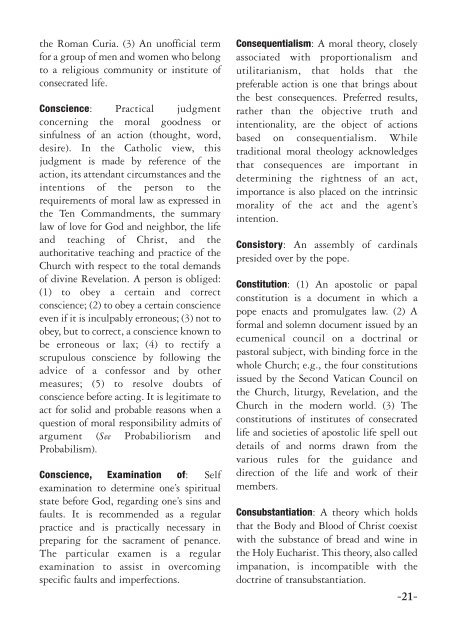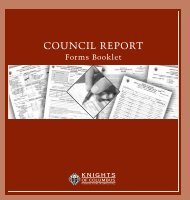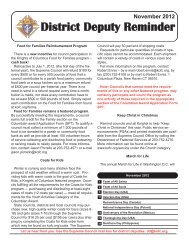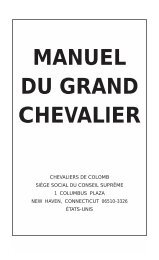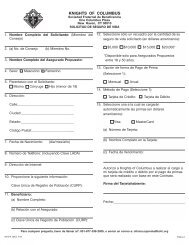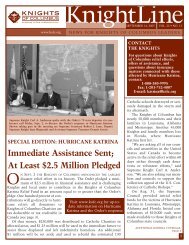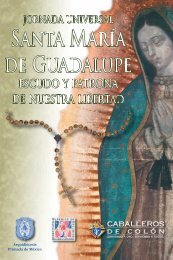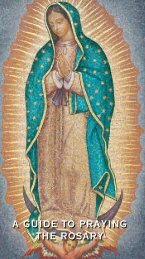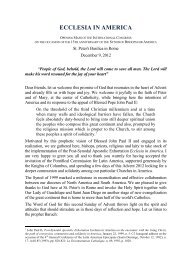CATHOLIC WORD BOOK - Knights of Columbus, Supreme Council
CATHOLIC WORD BOOK - Knights of Columbus, Supreme Council
CATHOLIC WORD BOOK - Knights of Columbus, Supreme Council
You also want an ePaper? Increase the reach of your titles
YUMPU automatically turns print PDFs into web optimized ePapers that Google loves.
the Roman Curia. (3) An un<strong>of</strong>ficial term<br />
for a group <strong>of</strong> men and women who belong<br />
to a religious community or institute <strong>of</strong><br />
consecrated life.<br />
Conscience: Practical judgment<br />
concerning the moral goodness or<br />
sinfulness <strong>of</strong> an action (thought, word,<br />
desire). In the Catholic view, this<br />
judgment is made by reference <strong>of</strong> the<br />
action, its attendant circumstances and the<br />
intentions <strong>of</strong> the person to the<br />
requirements <strong>of</strong> moral law as expressed in<br />
the Ten Commandments, the summary<br />
law <strong>of</strong> love for God and neighbor, the life<br />
and teaching <strong>of</strong> Christ, and the<br />
authoritative teaching and practice <strong>of</strong> the<br />
Church with respect to the total demands<br />
<strong>of</strong> divine Revelation. A person is obliged:<br />
(1) to obey a certain and correct<br />
conscience; (2) to obey a certain conscience<br />
even if it is inculpably erroneous; (3) not to<br />
obey, but to correct, a conscience known to<br />
be erroneous or lax; (4) to rectify a<br />
scrupulous conscience by following the<br />
advice <strong>of</strong> a confessor and by other<br />
measures; (5) to resolve doubts <strong>of</strong><br />
conscience before acting. It is legitimate to<br />
act for solid and probable reasons when a<br />
question <strong>of</strong> moral responsibility admits <strong>of</strong><br />
argument (See Probabiliorism and<br />
Probabilism).<br />
Conscience, Examination <strong>of</strong>: Self<br />
examination to determine one’s spiritual<br />
state before God, regarding one’s sins and<br />
faults. It is recommended as a regular<br />
practice and is practically necessary in<br />
preparing for the sacrament <strong>of</strong> penance.<br />
The particular examen is a regular<br />
examination to assist in overcoming<br />
specific faults and imperfections.<br />
Consequentialism: A moral theory, closely<br />
associated with proportionalism and<br />
utilitarianism, that holds that the<br />
preferable action is one that brings about<br />
the best consequences. Preferred results,<br />
rather than the objective truth and<br />
intentionality, are the object <strong>of</strong> actions<br />
based on consequentialism. While<br />
traditional moral theology acknowledges<br />
that consequences are important in<br />
determining the rightness <strong>of</strong> an act,<br />
importance is also placed on the intrinsic<br />
morality <strong>of</strong> the act and the agent’s<br />
intention.<br />
Consistory: An assembly <strong>of</strong> cardinals<br />
presided over by the pope.<br />
Constitution: (1) An apostolic or papal<br />
constitution is a document in which a<br />
pope enacts and promulgates law. (2) A<br />
formal and solemn document issued by an<br />
ecumenical council on a doctrinal or<br />
pastoral subject, with binding force in the<br />
whole Church; e.g., the four constitutions<br />
issued by the Second Vatican <strong>Council</strong> on<br />
the Church, liturgy, Revelation, and the<br />
Church in the modern world. (3) The<br />
constitutions <strong>of</strong> institutes <strong>of</strong> consecrated<br />
life and societies <strong>of</strong> apostolic life spell out<br />
details <strong>of</strong> and norms drawn from the<br />
various rules for the guidance and<br />
direction <strong>of</strong> the life and work <strong>of</strong> their<br />
members.<br />
Consubstantiation: A theory which holds<br />
that the Body and Blood <strong>of</strong> Christ coexist<br />
with the substance <strong>of</strong> bread and wine in<br />
the Holy Eucharist. This theory, also called<br />
impanation, is incompatible with the<br />
doctrine <strong>of</strong> transubstantiation.<br />
-21-


